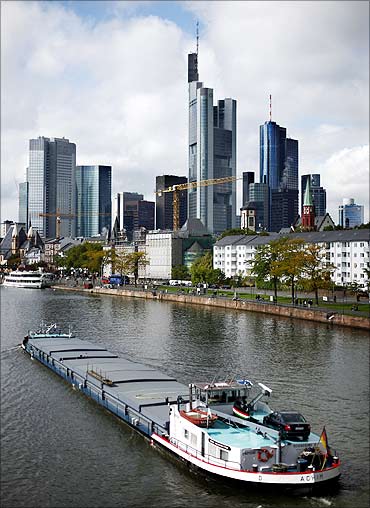 | « Back to article | Print this article |
Top destinations to study engineering abroad!
Even as engineering seats in many local colleges go vacant, thousands flock to the UK or Singapore to get a B.Tech. We examine the whys and the hows...
There are many reasons that direct students to study engineering abroad. Western countries usually offer well-rounded education while giving access to the latest innovations and research facilities.
Of late, even Asian countries such as Singapore and Hong Kong are becoming popular destinations because of their emphasis on experiential learning, international orientation and exceptional placement. Companies worldwide are also increasingly recognising the importance of international education.
Given the uncertainty of getting into a good engineering college in India, many students apply abroad to have a viable backup option.
Given today's plethora of choices, it is not so easy for Indian students to select where to study abroad. There are many popular destinations the US, UK, Singapore, Australia, Canada, New Zealand, Germany, Japan, etc.
Also, many schools have partnerships which allow students further flexibility. There are many factors which impact a student's decision long-term plans, employment options, medium of instruction, accessibility, budgetary constraints, etc. The most popular countries to pursue an engineering education remain the USA, UK, Canada, Singapore and Australia.
Admission criteria
Every country has its own set of rules for admission but some are common across the board. The basic criteria for admission abroad generally are
- Completion of the high school equivalent of the country you are applying to; this could be CBSE class 12th, the A levels, the International Baccalaureate (IB) programme or any other system recognised in India. A strong academic record is of primary importance for admission to a prestigious programme.
- Proficiency in English, which is often demonstrated by taking one of the standardised language proficiency tests such as the TOEFL (Test of English as a Foreign Language), IELTS (International English Language Testing System), etc.
- Most engineering programmes assume that you have studied Mathematics in all four years of high school; for some countries and programmes therein, it is also important that you have taken Physics and/ or Chemistry for this time period too. However, it is not unusual for a commerce student from India to opt for an undergraduate programme in Computer Science in the United States.
- A large number of schools abroad require students to take standardised tests like the SAT I and SAT II subject tests to be eligible for applying to the programme. Most top programmes in the US require the results of the SAT I and SAT II Subject tests.
- While making an admission decision, a number of schools also give weightage to a student's extra-curricular achievements. However, almost no school does this in substitute for academic preparation.
- In some countries, the minimum age for applicants to degree programmes is 18 years.
Click NEXT to continue
Application process starts year in advance
The application calendar
The admission process often begins in the year prior to the start of the programme. Hence, it is important that students start checking on admission requirements as early as in class 10. Doing well on standardised tests requires preparation. Often, schools will make decisions before the final high school result is out. The students' earlier academic record is what is considered. So, it is not a good idea to take the class 11 examination lightly!
Some of the factors that one must take into consideration before deciding to apply to a school are:
- The alignment of the curriculum vis- -vis your career goals
- Accreditation
- Cost
- Duration of the programme
- Career prospects upon completion of the programme, etc. Over the years, it has become easier to apply since most programmes have online applications. Almost all require your academic transcripts, letters of recommendations from your teachers, personal statements and proof of finances.
The information that follows is general for each country; in order to make an application, you are advised to consult the school's website.
Applying to the US is a time-consuming process
United States of America
Most colleges and universities in the US manage their admissions process independently. Since admission criteria vary across schools, applying to the US is a time-consuming process. While selecting schools, it is important to check their accreditation. ABET (Accreditation Board for Engineering and Technology) evaluates and accredits engineering programmes in the US. It is important to note that ABET accredits disciplines, not schools. Therefore, within an emerging school, some fields may be accredited whilst others are not.
US engineering programmes are of four years' duration and there are many schools that offer an integrated 5-year Master's and Bachelor's programme. Research and internship opportunities abound at the undergraduate level also. There is tremendous flexibility in selecting courses and an engineering education is quite comprehensive as it includes various areas of study. The better programmes require results from the SAT I and the SAT II examinations.
Undergraduate education is generally credit-based, which means that you graduate when you complete the requisite number of credits, not years! One course normally is equivalent to 3 credit hours.
While some students graduate ahead of schedule by taking more courses per semester or taking courses in the summer sessions, it is also possible to get a head start by either taking the Advance Placement (AP) tests or by studying in the IB system.
Costs vary across colleges tuition fee can vary from USD 20,000 to USD 45,000 per year. There are scholarships but few at top schools are available to international students. There is need-based financial aid available to international students at some schools; it takes into account the family's financial circumstances by asking for documents such as Income-tax returns to assess need.
Keep in mind that asking for financial assistance can adversely impact your application process. Engineering students are permitted to stay in the country for up to 29 months on optional practical training upon completion of their degree programme.
Click NEXT to continue
Australian degrees have worldwide acceptance
Australia
Australia has been a popular destination for Indian students for almost two decades now. It boasts of an excellent education system with an emphasis on experiential learning.
Australian degrees have worldwide acceptance and the quality of scientific research is rather high. Until now, it was also a safe destination for Indian students.
To gain entry into an Australian undergraduate course, you need to have an Australia Senior Secondary Certificate of Education (Year 12), or the overseas equivalent such as the Indian class 12 certificate. Students are expected to have scored 60% or better.
All programmes require Indian students to demonstrate their proficiency in written and spoken English normally by taking the IELTS test. This test must have been conducted not more than 24 months before the day on which the application is being made. The score on this test must be a band of 6 or higher for most schools of repute.
There are generally two intakes in a year February and July. Engineering programme applicants must have Mathematics in all four years of high school. Most programmes assume that students would have taken Physics and/or Chemistry in high school up to grade 12.
The duration of the course is three years. Tuition for most schools is in the range of A$9,000 to A$14,000 per year. Scholarships are available to Indian students.
As an international student, you must pay your tuition fees upfront.
Click NEXT to continue
The admissions process is simpler
Singapore
In the last few years, Singapore education has become rather popular.
Singapore's proximity to India, its reputation as a safe country, lower cost of education and extensive employment opportunities make its undergraduate education a very viable option for Indian students.
The admissions process is simpler, fewer standardised tests need to be taken and getting a student visa is far easier than applying for the same to any of the western countries.
The tuition costs generally vary between S$24,000 to S$30,000 per year. While there are scholarships available for international students, they are keenly contested.
While the three local universities National University of Singapore (NUS), Nanyang Technological University (NTU) and Singapore Management University (SMU) offer internationally recognised degrees, many of the world's leading foreign universities have also made their presence in Singapore.
They have either set up a campus (institutes of higher learning) or have joint collaborations/programmes with local universities (local tie-ups). Such schools include INSEAD, Duke University, Georgia Tech, MIT, etc. Engineering programmes in Singapore boast of state-of-the-art infrastructure and technology.
Admission to engineering programmes in local universities such as NUS and NTU depends mostly on the student's academic performance.
Undergraduate engineering programmes are of four years' duration. Intake is once a year in July. The deadline for submitting the application is different for the schools but decisions are made only after the university receives the result of the Class 12 examination.
Click NEXT to continue
German language skills are not a prerequisite
Germany
Germany is a world leader in exports and R&D. It is also India's most important EU business partner, especially for machinery, automobiles, chemical and electrical products as well as IT.
With more than 300 institutions of higher education, it is one of the leading countries in the field of research, science and technology. There are many reasons to study in Germany:
- Excellent academic standard
- Germany provides the best and the most cost-effective study options for overseas students. Most colleges are state-funded. In 2010, five of Germany's 16 states charged tuition fees at state-funded colleges, while in 11 states, tuition was provided free of charge.
- There are no university-sponsored scholarships in Germany, but a number of private and public institutions award scholarships, usually to cover living costs and books.
- Internships the completion of your programme is followed by paid internship in top MNCs that lead to full-time placement.
- Students are allowed to stay on and work for 1 year after completion of their study programmes.
Most programmes are exclusively taught in English, therefore, German language skills are not a prerequisite. If you are willing to learn German, you can join the German Language Courses at the University, which are free of charge.
As a foreign student, you are allowed to work 90 days or 180 half days in a calendar year. This right is not restricted for campus jobs like in the US. You can obtain Permanent Residency within 5 years of working full-time in Germany.
So get ready to pursue a dream engineering degree on foreign shores.
The author is Co-founder, Managing Director, International Educational Exchange, India





